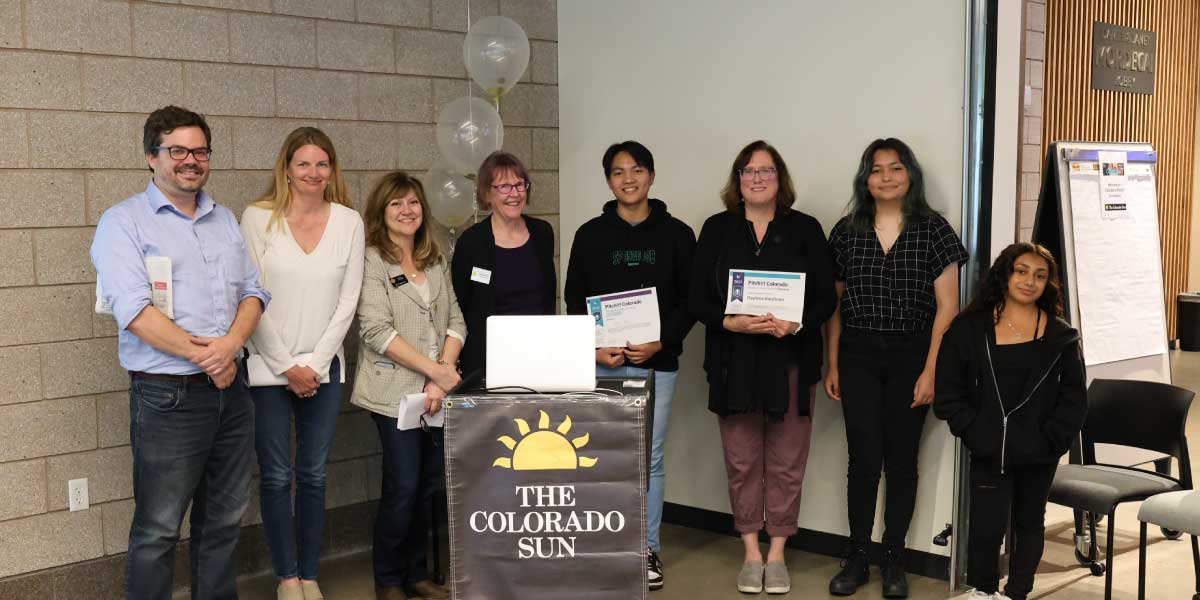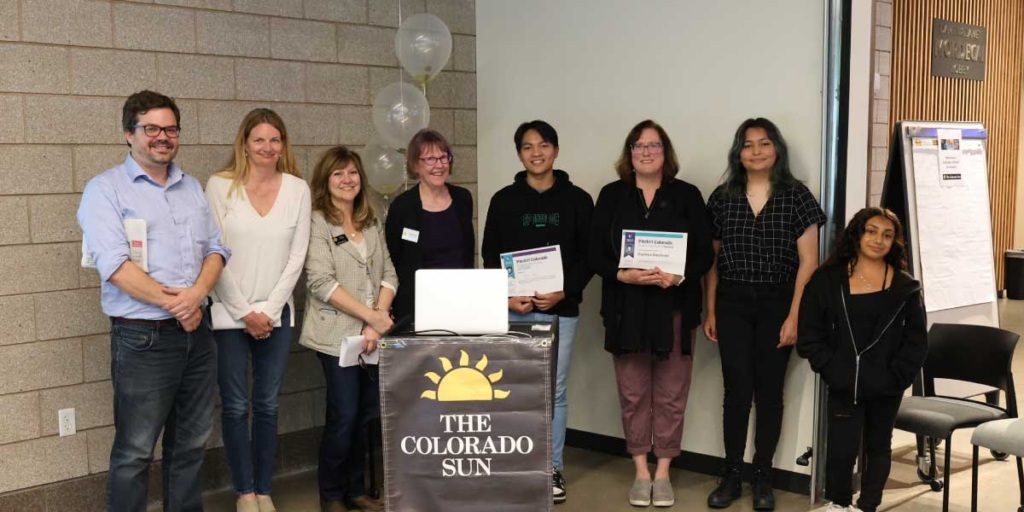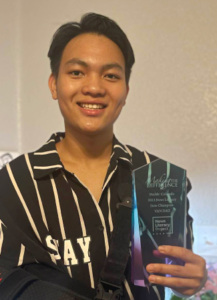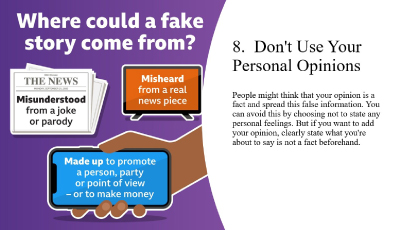
Learning news literacy from a fresh perspective – lessons from our popular PitchIt! student contests
With misinformation, doctored images, and AI-generated misleading photos and videos spreading on social media, young people need news literacy skills now more than ever. For the past three years, an essay contest sponsored by the News Literacy Project has encouraged students to fact-check online content and seek out credible sources, helping them become responsible and informed news consumers.
The PitchIt! student essay competition challenges students to write short essays in response to one of six prompts using a news event as a focus. Students need to think through questions that address topics such as First Amendment protections for the press, how news consumers can fact-check statements from public figures, why sharing reliable information is a civic responsibility and the consequences of spreading misinformation online.
Once students have completed their essays, each participating school and/or educator chooses middle school and high school entries to submit. Ambassadors from NewsLitNation® or NLP’s staff review the submissions, awarding first through third place for the essays. The selected students then move to the “pitch” phase, presenting ideas, arguments and examples from their essays to a panel of professional journalists, who provide real-time feedback and select the grand prize winners.

The Colorado PitchIt! State Championship, held May 15 and hosted by The Colorado Sun, included, from left: Political consultant Tyler Sandberg, Jennifer Brown of The Colorado Sun, Colorado State Sen. Lisa Cutter, Sandra Fish of The Colorado Sun, student Van Dao, educator Raylene Kaufman, and students Adriana Ramirez-Diaz and JoLene Urioste. Photo credit: Miriam Romais, the News Literacy Project.
PitchIt! was launched in 2020 by Florida NLP ambassador Monica Valdes and has grown each year since then, said Miriam Romais, NewsLitNation director. NLP partnered with Miami-Dade County Public Schools for previous contests and teamed up this year with The Colorado Sun and the Colorado Language Arts Society for a first in-person PitchIt! event to award a state champion title. NLP is hoping to expand the contest again in 2024, Romais said, giving more young news consumers hands-on experience accurately assessing the news in a complex information landscape.
“Being assigned the PitchIt! essay is just the start of the students’ thinking process, involving research, fact-checking, credible sourcing and critical thinking skills,” Romais said. The news literacy prompts provide the opportunity for students to work closely with their teachers to produce original analyses and fresh perspectives on their chosen topic. Then, when selected students get to the grand prize stage, “they must distill their ideas further to present their concepts to a panel of journalists for live feedback,” Romais said.
Citing sources to support facts
This year’s contest, held in May, drew some 350 students and 14 of their teachers from Colorado, Florida and New York and one county in Pennsylvania. Thirty-one students made it to the finalist stage. Of those, 13 appeared before a panel of journalists to distill their essays into three-minute oral presentations.
In an entry illustrated with maps and detailed images to drive home her points, Miami 10th grader Saffron Carson highlighted coverage of figures as disparate as former Secretary of State Hillary Clinton and singer Courtney Love when responding to the prompt, “How can we become responsible consumers and producers of news and information?” Saffron had a warning for all: “Sources that are found to provide unreliable information of any kind are likely to lose their credibility. … Distrust is not only limited to mass media outlets. … By spreading unreliable information, individuals are putting their own credibility at stake.” Saffron earned the grand prize from her state.
 Students were judged in part on their use of sources to support their facts — a key element of credibility in reporting. Van Dao (pictured left), a 10th grader from Colorado, explored misinformation surrounding the Feb. 3 freight train derailment in Ohio. Debunking a TV personality’s commentary that, as Van wrote, “focuse[d] on the consumers’ emotion” rather than facts, Van cited accurate coverage by The Associated Press and NPR and referred to FactCheck.org, PolitiFact and Snopes as sites to use in trying to verify information. Van was the state champion.
Students were judged in part on their use of sources to support their facts — a key element of credibility in reporting. Van Dao (pictured left), a 10th grader from Colorado, explored misinformation surrounding the Feb. 3 freight train derailment in Ohio. Debunking a TV personality’s commentary that, as Van wrote, “focuse[d] on the consumers’ emotion” rather than facts, Van cited accurate coverage by The Associated Press and NPR and referred to FactCheck.org, PolitiFact and Snopes as sites to use in trying to verify information. Van was the state champion.
Van’s teacher, Raylene Kaufman, said her student had worked both hard and smart: “Van researched longer and more complex articles on this subject. We held many writing conferences because he wanted to be sure that he was reading and writing about the information clearly.”
Romais noted that educator collaboration with participating students is a key part of the learning. “The teacher practices with them. We encourage that partnership as they work on reading, writing and public speaking skills.”
Saffron’s teacher, Renee Cantave, told NLP in an email that the contest opened the door for her to use NLP’s free news literacy resources in her teaching. “Integrating PitchIt! in my classroom has been a SPECTACULAR experience that I would not trade for the world. Seeing my students realize the power of words and access to accurate information is invaluable. The resources offered in the NewsLit community are so helpful for everyone. I hope educators take this opportunity to apply the concepts that are being taught.”
The collaboration also is reflected in students’ deeply researched and creative presentations. Stevie D. Rosenfeld, an 11th grader, chose to answer this prompt: “How do confirmation bias, stereotyping and other cognitive biases impact how we interpret events, news and information?” Her PowerPoint response included images of newspapers retrieved from archives, winning her the high school grand prize in the New York contest. She displayed headlines about the 1898 sinking of the battleship USS Maine as well as coverage of the Jan. 6 attack on the U.S. Capitol and the Black Lives Matter movement to highlight starkly different language used by various outlets to cover the events.
Recognizing biases
 Miami sixth grader Naomi Celestin’s winning entry (pictured right) addressed this prompt: “Explain which news literacy skills are essential to responsible civic participation.” She wrote, “Providing reliable information should be a responsibility” — and, she noted, news consumers also are accountable for making sure a source is reliable. “Check if the source is one-sided or if the source is providing facts, not opinions.”
Miami sixth grader Naomi Celestin’s winning entry (pictured right) addressed this prompt: “Explain which news literacy skills are essential to responsible civic participation.” She wrote, “Providing reliable information should be a responsibility” — and, she noted, news consumers also are accountable for making sure a source is reliable. “Check if the source is one-sided or if the source is providing facts, not opinions.”
For her presentation, eighth grader Jorja Jackson of New York wrote about misinformation: “We all have biases, whether conscious or unconscious, but having biases doesn’t make us bad people. However, when we choose to not recognize these biases that are influenced by societal stereotypes and our upbringing, we risk not understanding the real world around us.”
Asked why she picked the topic, Jorja said in an email that this subject “truly resonated” with her in that “biases we as a society have … affect the spread of misinformation.”
It’s the second year of participation in PitchIt! for Jorja’s teacher, Terence Higginson, who named several benefits in addition to what can be gained from the year-round news literacy coursework.
“First, our students can measure their writing skills against other participants in the competition, which allows them to recognize their unique talents, while also acknowledging the tremendous talents of other writers in the competition,” Higginson said. “Another wonderful benefit is the oral portion of the competition where our students are given the opportunity to be self-reflective about their writing experiences, which is an invaluable talent for them to develop for their future academic endeavors.”
NLP news literacy ambassadors helped review the essays for accuracy, readability and creativity, handing out first-, second- and third-place awards. Those winners went to the next stage of the competition: judging by journalists who selected the grand prize for the state. Grand prize winners earned gift cards or trophies.
“For those interested in participating in PitchIt! next year,” said Romais, “consider contacting your local news literacy ambassador. Or become one!”
Winners
- Colorado State Champion: Van Dao, high school; teacher: Raylene Kaufman
- Florida Grand Prize winners: Naomi Celestin, middle school; teacher: Tai-Li Frazer.
Saffron Carson, high school; teacher: Renee Cantave - New York Grand Prize winners: Jorja Jackson, middle school; teacher: Terence Higginson. Stevie D. Rosenfeld, high school; teacher: Brittany Kaminski
- Pennsylvania-Allegheny County Grand Prize winner: Amya Wise, high school; teacher: Deborah Domingues-Murphy
Contest jurors
Allegheny County, Pennsylvania:
- Anya Litvak, energy reporter, Pittsburgh Post-Gazette
- Arturo Fernandez, assistant managing editor, visuals and interactive, Pittsburgh Post-Gazette
Florida:
- Tamoa Calzadilla, editor in chief, Factchequeado
- Sommer Brugal, K-12 education reporter, Miami Herald
New York:
- Tandy Lau, public safety reporter, New York Amsterdam News
- Jessica Gould, education reporter, WNYC
- Lily Rothman, managing editor, Time
Colorado:
- Jennifer Brown, co-founder and reporter, The Colorado Sun
- Sandra Fish, reporter, The Colorado Sun
- Lisa Cutter, Colorado state senator
- Tyler Sandberg, political consultant
NLP’s news literacy ambassadors and event organizers:
- Monica Valdes, Florida (creator of event)
- Amanda Escheman, Colorado
- Alesha Smith, New York
- Deborah Domingues-Murphy, Pennsylvania